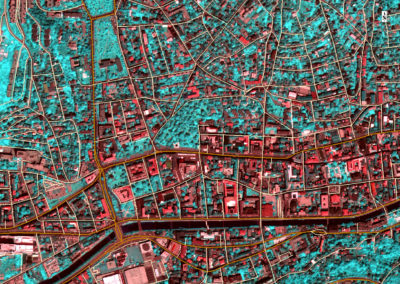
Satellite images capturing beyond the visible, are used to extract vehicles from road networks over main cities globally. WorldView-2 Image courtesy of DigitalGlobe
Bristol, UK 07 May 2019 – TCarta, a global provider of geospatial solutions, has teamed with King’s College London to win funding from the European Space Agency (ESA) to develop an air quality modeling service that leverages commercial satellite imagery. The service will provide organisations with accurate snapshots of existing air quality conditions along with modeling outputs to forecast how modifications in pollutant sources can change concentrations in the air over time.
The TCarta and King’s team will match the 1.5 million euros awarded by the ESA ARTES 20 program for a demonstration project that will generate air quality data for a number of major cities worldwide and deliver products through online services, API’s and data feeds. TCarta and King’s successfully proved the technical and commercial viability of the service in a pilot study also funded by ESA in 2018.
The air quality service will be offered commercially as a solution for governments at local and regional levels, as well as NGOs, to better understand the mechanisms affecting airborne pollutants so that air quality can be managed and mitigation strategies put in place. Other end users will include automotive manufacturers, mobility service providers and construction companies that need to model the impact their products and activities have on the surrounding environment and people’s health.
“There is currently a lack of accurate and reliable air quality data around the world – which is leading to poor decision making,” said Greg Lewis, TCarta Business Manager. “Our product will be a practical step to easily access accurate data and to support better and more informed decision making.”
Until now, the availability of traffic data has been fragmented due to limited deployment of roadside sensors and is non-existent in many developing regions of the world. TCarta have devised algorithms to extract automobile counts on roadways from very high-resolution (VHR) satellite imagery, to be used as additional inputs to King’s industry-leading air quality modelling capabilities. Collection of vehicle counts from satellite imagery over any city on Earth will provide a consistent and global data set, and funding from ESA will be essential to improve, scale up and develop the data processing methodologies.
“Very high-resolution air quality modeling of this type is only possible with a detailed understanding of roadside emissions, which is now possible through our unique earth observation approach,” said Sean Beevers, Air Quality Lead at King’s. “We will be able to bridge the data gap in areas of the world where detailed traffic information has been hard to come by.”
TCarta is currently developing a range of online services to deliver a variety of digital air quality products, many of which will be available as off-the-shelf data sets in geospatial formats. Pollutants measured and mapped will include particulates (PM2.5 and PM10), NOx, NO2, and others.
Visit the Air Quality website: http://air-quality.tcarta.com
About TCarta (www.tcarta.com)
TCarta was established when TCarta Marine U.S. merged with Proteus Geo UK to create global bathymetric and marine datasets extending from the shallow coastal zone to the continental shelf. The international firm maintains offices in the UK, UAE and USA. The TCarta product lines includes high-resolution satellite-derived water depth and seafloor map products as well as 90- and 30-meter GIS-ready bathymetric data aggregated from numerous information sources.
About King’s College London
King’s College London is one of the top 10 UK universities in the world (QS World University Rankings, 2018/19) and among the oldest in England. King’s has more than 31,000 students (including more than 12,800 postgraduates) from some 150 countries worldwide, and some 8,500 staff. King’s has an outstanding reputation for world-class teaching and cutting-edge research. In the 2014 Research Excellence Framework (REF), eighty-four per cent of research at King’s was deemed ‘world-leading’ or ‘internationally excellent’ (3* and 4*). Since our foundation, King’s students and staff have dedicated themselves in the service of society. King’s will continue to focus on world-leading education, research and service, and will have an increasingly proactive role to play in a more interconnected, complex world. Visit our website to find out more about Vision 2029, King’s strategic vision for the next 12 years to 2029, which will be the 200th anniversary of the founding of the university. World-changing ideas. Life-changing impact: https://www.kcl.ac.uk/news/headlines.aspx
About European Space Agency (www.esa.com)
The European Space Agency’s mission is to shape the development of Europe’s space capability and ensure that investment in space continues to deliver benefits to the continent’s citizens. ESA’s ARTES 20 programme (Advances Research in Telecommunications Systems) responds to users’ needs using a combination of different space assets such as Earth Observation, navigation and telecommunications. (https://artes-apps.esa.int/)
